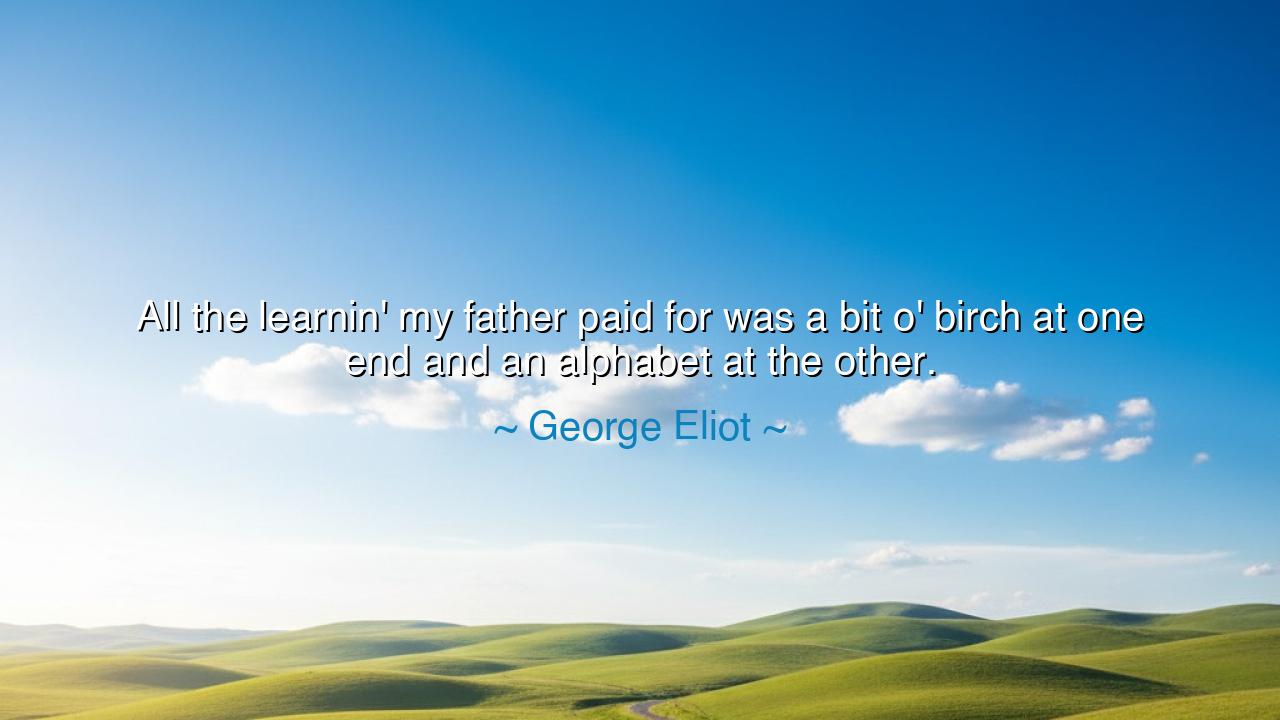
All the learnin' my father paid for was a bit o' birch at one end
All the learnin' my father paid for was a bit o' birch at one end and an alphabet at the other.






The words of George Eliot, “All the learnin’ my father paid for was a bit o’ birch at one end and an alphabet at the other,” come to us like a whisper from a simpler, sterner age—a time when education was a luxury, discipline was the rule, and wisdom was earned not in gilded halls, but through hardship and humility. In this wry reflection, Eliot captures both the humor and the hardship of early learning. The “birch” she speaks of is no metaphor for gentleness—it is the rod of correction, the branch once used by teachers to drive knowledge into unwilling minds. And the “alphabet” at the other end signifies the meager beginnings of literacy, the first humble steps toward enlightenment. Between the sting of punishment and the seed of learning lies the truth of human education: that wisdom is often born through struggle.
To understand this quote, one must look not only at the words but at the life behind them. George Eliot, born Mary Ann Evans, grew up in rural England in the early 19th century—a world divided sharply by class, privilege, and opportunity. For the poor, schooling was brief and harsh; for the wealthy, it was refined but distant from life’s realities. Eliot, the daughter of a stern but practical father, knew the value of discipline and self-education. Her wit in this line conceals deep gratitude: though her father’s provision for her schooling was modest—“a bit o’ birch” and “an alphabet”—it was enough to open the gates of her genius. The quote stands as a tribute to the power of humble beginnings and the transformation of hardship into greatness.
The birch, symbol of correction, is not merely an instrument of pain but a symbol of structure. In the old days, learning was not softened with comforts. Children learned their letters under the watchful eyes of strict masters, whose methods would seem cruel to modern ears. Yet from that severity arose endurance and focus, virtues often lost in gentler times. Eliot reminds us that true learning is not the accumulation of facts, but the shaping of character. Knowledge gained without discipline is like a field left untilled: fertile perhaps, but overgrown with vanity. The alphabet, though small, was the key to a vast kingdom of thought; the birch, though feared, was the gatekeeper that ensured the child learned to enter with respect.
Consider the story of Abraham Lincoln, who, like Eliot, began with little more than an alphabet and a will to learn. His father could not afford tutors, and his schooling amounted to less than a year in total. He studied by firelight, writing on wooden shingles, with only a Bible and a few borrowed books. No one spared him from labor or hardship; the “birch” in his case was life itself—its toil, its loss, its endless demand for perseverance. Yet from such rough beginnings arose a man of extraordinary wisdom and eloquence. Lincoln’s greatness was proof that education of the soul begins not in luxury, but in the fire of effort and humility.
Eliot’s line also carries a quiet satire of society’s obsession with status. Her voice suggests both affection and irony—“All the learnin’ my father paid for” could be read as a jest upon those who think that money alone brings wisdom. The truth she unveils is timeless: education is not bought—it is built. The alphabet, learned once, must be applied for a lifetime; the discipline of the birch must evolve into the discipline of self-mastery. In this balance lies the foundation of all human progress. The wise do not scorn the small beginnings of their learning—they honor them, knowing that every word of wisdom was first a letter painfully traced.
In our modern world, where comfort and convenience have replaced hardship, Eliot’s words resound with renewed power. Too often, we seek knowledge without effort, progress without patience, and freedom without discipline. Yet no great mind was ever forged without the sting of the birch—whether it came as failure, struggle, or sacrifice. The alphabet may be simple, but to master its use—to turn letters into truth and thought into virtue—requires endurance. Eliot teaches us that even the smallest start, if shaped by perseverance, may lead to greatness.
Thus, the lesson is clear: cherish your beginnings, no matter how humble. Do not despise the teacher who corrects you, nor the discipline that tempers you. For within those early trials lies the seed of wisdom. The birch that stings today may one day be the root of your strength; the alphabet you struggle to learn may one day give birth to your voice. The ancients said that the tree of knowledge grows only through toil, and Eliot reminds us of the same.
So, O seeker of wisdom, let your learning be more than comfort—let it be courage. Do not fear the hard path, for it is the true school of greatness. The world’s finest education may begin, as Eliot’s did, with nothing more than a rod and a few letters—but if one’s heart burns to understand, those few letters can become a world. For in the end, it is not the price of learning that matters, but the passion with which we pursue it. And that passion, once awakened, is a flame that no birch can extinguish.






AAdministratorAdministrator
Welcome, honored guests. Please leave a comment, we will respond soon